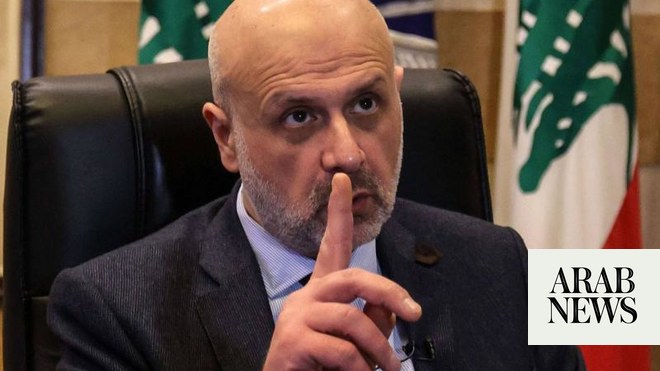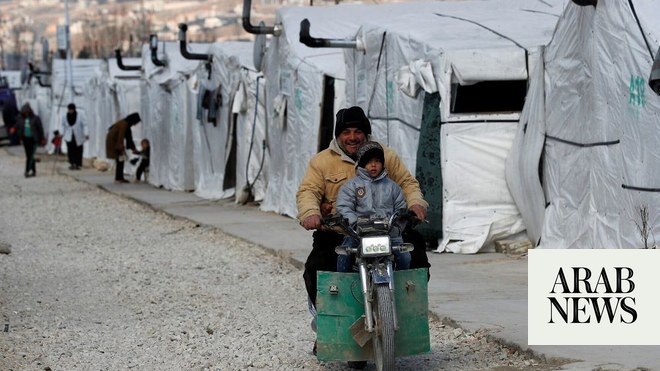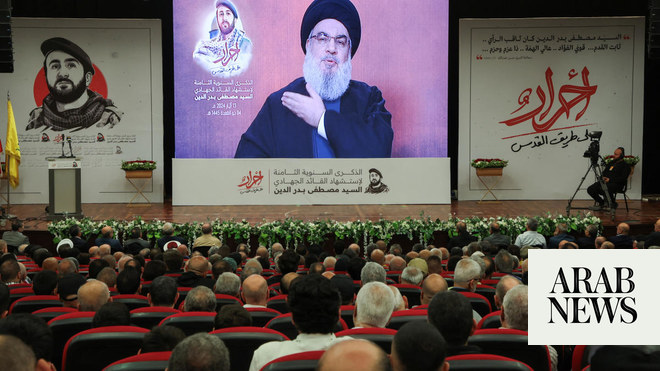
A number of refugees from the town of Flita were reluctant to return after hearing of revenge incidents
“Hezbollah’s mission in Syria has not yet been completed and as long as the threat of terrorists lingers there, Hezbollah will stay no matter the number of fighters”
BEIRUT: More than 11 days have passed since Hezbollah opened reception centers in Bekaa, a southern suburb of Beirut, and southern Lebanon where Syrian refugees can apply to return to their home country. However, the number of applicants so far has been rather small.
Many of the refugees had one simple question for the Hezbollah officials at the centers: “Will you take us to the Lebanese-Syrian border and dump us there or will you take us to our houses, which you helped destroy, inside Syria?”
Hezbollah opened the repatriation centers in response to the Iranian position, which was later confirmed by Hossein Jaberi Ansari, the Iranian president’s special envoy to Beirut. He said: “One of our top priorities at this stage is the issue of Syrian refugees and ensuring their safe return to their homeland. We cannot discuss a final solution to the Syrian crisis unless refugees are back in their homeland, cities and villages.”
On July 23, about 1,200 people will return from the Lebanese town of Arsal, near the border with Syria, to their homes West Qalamoun.
Arsal Mayor Basil Al-Hajjiri said that the return of this group, the third batch of refugees to go home, comes within the framework of a reconciliation with the Syrian authorities, and in coordination with Lebanese General Security.
He added that it had been initiated by the refugees themselves.
“Most of those refugees do not have identification papers to travel outside Arsal and they acted before Hezbollah urged them to submit applications through the party’s centers, and prior to Foreign Minister Gibran Bassil’s call,” said Al-Hajjiri.
“They have agreed to return in light of the developments in the areas surrounding their homes. Neither Hezbollah nor minister Bassil can make them return if they were not fully convinced of their ability to go back to their homes under safe circumstances.”
A source responsible for Hezbollah’s refugee application center in Hermel said it had received telephone calls from Syrians in Wadi Khaled, northern Lebanon, saying it was difficult for them to get to Bekaa to register but that they want to return to their hometown of Talkalakh, having fled the fighting there.
A Hezbollah official said: “Communicating with those refugees requires certain arrangements on which we are currently working.”
But what guarantees can Hezbollah offer refugees who wish to return?
The official said: “Hezbollah’s mission in Syria has not yet been completed and as long as the threat of terrorists lingers there, Hezbollah will stay no matter the number of fighters.”
The Hezbollah source in Hermel confirmed that they do not provide any reassurances or guarantees to refugees about what might await them upon their return to Syria.
“We take individuals’ and families’ names and promise to secure the transportation of all their belongings, but if their houses were destroyed, we cannot promise to rebuild them,” he said. “We collect applications and submit them to the concerned committee.”
Asked how Hezbollah can reassure refugees of their safety even though the party’s fighters are still operating inside Syria in support the regime against the opposition, the Hezbollah official said: “People fought and reconciled throughout the history of mankind. A reconciliation must take place and I believe it is what refugees want.”
He fears that if the Syrian refugees remain in Lebanon, they may cause a demographic change, pointing out that each of the families that had registered at the center included at least 10 members.
Former member of Parliament Nawar Al-Sahili, who heads the committee formed by Hezbollah to oversee the return of Syrian refugees, said the number of registered families so far does not exceed 150.
“We want to send people back to safe areas, not ones that are still undergoing security developments; repatriation does not include returning to Idlib or Deir Ezzor, for instance,” he said, adding that “the applications will be handed over to the Syrian authorities to be approved.”
As for what awaits refugees who return to Al-Qusayr and its countryside, given that most of them are dissidents who took part in anti-regime demonstrations, Al-Sahili said: “We must find a solution for this issue.”
Arsal Mayor Al-Hajjiri said the information he has been given suggests the return of refugees to Al-Qusayr has been postponed by the Syrian authorities and Hezbollah.
“There is great destruction and people want guarantees that can only be provided by those controlling the territory,” he said.
Al-Hajjiri added that a number of refugees from the town of Flita were reluctant to return after hearing of revenge incidents. He believes the return of refugees to Al-Qusayr and its countryside will require not only a reconciliation but a general amnesty.
He pointed out that the road to West Qalamoun is safe but there is a need for a diplomatic route, which remains impassable for now.












